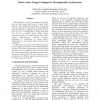Free Online Productivity Tools
i2Speak
i2Symbol
i2OCR
iTex2Img
iWeb2Print
iWeb2Shot
i2Type
iPdf2Split
iPdf2Merge
i2Bopomofo
i2Arabic
i2Style
i2Image
i2PDF
iLatex2Rtf
Sci2ools
107
click to vote
ISVLSI
2006
IEEE
2006
IEEE
Defect-Aware Design Paradigm for Reconfigurable Architectures
With advances in process technology, the feature sizes are decreasing, which leads to higher defect densities. More sophisticated techniques, at increased costs are required to avoid defects. If nanotechnology based fabrications are applied, the yield may even go down to zero, as avoiding defects during fabrication will not be a feasible option. Hence, future architectures have to be defect-tolerant. Most of the current defect-tolerance schemes introduce redundancy in architecture to combat defects. Alternatively we can introduce defect tolerance in the design-flow. In this paper we analyze the bottlenecks faced by current design-methodologies while addressing defect tolerance. We study the performance of present Place and Route tools on a defective fabric in terms of area and critical delay penalty, and explore routing aware placement in this context. We have proposed a new cost function, CA-RISA for improving the performance in a defect-aware environment.
Related Content
| Added | 12 Jun 2010 |
| Updated | 12 Jun 2010 |
| Type | Conference |
| Year | 2006 |
| Where | ISVLSI |
| Authors | Rahul Jain, Anindita Mukherjee, Kolin Paul |
Comments (0)

